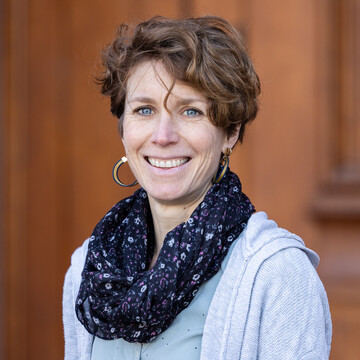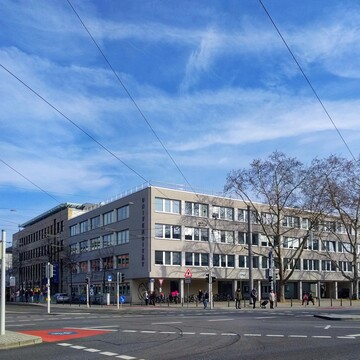Bachelor’s Program in Sociology
Obtain your degree with a career-oriented and international program
Sociology deals with social behavior and the underlying structures and systems. Social scientists research how people live together in society and investigate the values and norms evident and valid in groups, social systems, or organizations. Inequalities and conflicts prevailing in social groups or the changes taking place within them can also be the subject of sociological examinations.
The bachelor's program in Sociology provides you with the basics of sociological thinking and research: you will learn to examine the various manifestations and developments of human coexistence and to analyze them applying scientific methods in order to better recognize and understand interrelationships.
Not all universities teach and conduct research in the same field of sociology – instead, they have different focuses. For this reason, choosing the right university is of particular importance.
The bachelor's program in Sociology at the University of Mannheim
In Mannheim, researchers at the Department of Sociology focus, in particular, on exploring European societies. Specifically, the focus is on the sociology of work, education, family, and migration, economic and organizational sociology, and social stratification.
A special feature of the Mannheim program in Sociology is the integration of Social Psychology. In this field, students learn about and gain a better understanding of social self-concepts, group processes, and attitudes as well as their changes or stereotypes.
The Department of Sociology at the University of Mannheim is also internationally renowned for its strong emphasis on empirical-analytical research, which is informed by theory and relies on quantitative methods such as computer-aided statistical analysis. Students therefore have the opportunity to independently carry out research projects in separate courses.
Good to know
What are the contents of the Mannheim program in Sociology?
In addition to the core subject, the bachelor's program in Sociology taught in Mannheim includes supplementary modules, comprising the Career Development Module (including a mandatory internship), the Social Skills Module and the minor.
Interdisciplinarity is an important aspect of our degree program and allows you to shape your individual profile according to your interests.
Program structure of the bachelor’s program in Sociology (PDF file)
Detailed information about the structure of the bachelor’s program in Sociology
What are quantitative methods?
Empirical social research involves the systematic collection of data on social relationships, for example by means of observations, interviews, experiments and their evaluation using various statistical methods.
Quantitative methods in empirical social research focus on objective measurements, i.e. countable characteristics. Data is collected, for example, with the help of questionnaires or surveys, but also through observation and in experiments, and then evaluated and analyzed using statistical, mathematical or numerical methods. This way, hypotheses can be generated and/
or tested. During your bachelor's degree at the University of Mannheim, you will first take the basic module in Methods and Statistics, which covers the following topics:
- designing surveys,
- developing questionnaires,
- selecting measuring instruments and research designs,
- practical data collection,
- data analysis using statistical methods.
In the advanced methods module, you will carry out an independent research project together with your fellow students as part of the research internship.
How important are math skills for studying Sociology?
Training in statistics is an essential part of the degree program in Sociology. You will use statistical formulas to test hypotheses and calculate the strength of social correlations and influencing factors.
But do not worry: you do not need to be a math genius to cope with statistics during your studies. Basic math skills are sufficient.
How important is it to know English when studying Sociology?
Most sociological literature is written in English. You should therefore be able to read and understand English texts. However, it is not necessary to be fluent in English.
Term papers are usually written in German. However, it is quite possible that seminars will be taught in English, which means that you will also have to write presentations and assignments in English.
How do I apply for a study place at the University of Mannheim?
The University of Mannheim does not apply a numerus clausus system (grade-point average for admission to certain programs of study). Instead, we take many different criteria into account in our selection process.
What career options do I have with a bachelor's degree in Sociology?
Graduates of our bachelor's and master's programs in Sociology work in various professional fields requiring profound empirical-analytical skills and in-depth knowledge of quantitative methods. Whether in academia or in other areas, for example in the public or private sector, social scientists have many different career opportunities.
What does Sociology not involve?
Working with people
A common misconception is that studying a program in Sociology will provide you with training in social pedagogy or social education and that you will develop the skills and qualification necessary for working in the social sector, for example in kindergartens, youth homes, family support or in institutions for the disabled. If you are looking for training in this field, a degree program in Social Pedagogy or Social Work would be the right choice for you. Under no circumstances is Sociology the same as Social Pedagogy or Social Work. Degree programs in Sociology neither teach social education concepts nor impart pedagogical skills.Educational Science
Neither is the education of children part of a degree program in Sociology. This is taught in the field of Educational Science.Psychological counseling
Students of a degree program in Sociology do not learn how to provide psychological counseling. This aspect rather pertains to training in the fields of Social Pedagogy or Psychology.Developmental psychology
Developmental psychology forms part of the subject of Psychology and is not taught in this form as part of programs in Sociology.
Get information about the program directly in your inbox
Register for the information mailing about the Sociology degree program free of charge and without obligation.
Info-Mailing
Academic advising
Do you have any more questions? We’re happy to advise you!
If you have any questions on your degree program (course contents, program structure, stays abroad), don’t hesitate to contact our program managers. For questions relating to the application process, please contact the Admissions Office.

Dr. Claudia Eckhardt-Kamps (she/her)
School of Social Sciences
A 5, 6
Building A – Room A 417
68159 Mannheim
Please note: Only online consultations are offered currently. Please make an appointment at https://www.sowi.uni-mannheim.de/online-beratung/claudia-eckhardt-kamps/
Admissions Office
 Credit: Anna Logue
Credit: Anna LogueAdmissions Office
University of Mannheim
L 1, 1 – Room 157, 158
68161 MannheimAdvising for international students
Team International Degree-Seeking Students
University of Mannheim
Division II – Student Affairs
International Office
L 1, 1 – Room 108/109
68161 MannheimE-mail: degreeseekingsuni-mannheim.deConsultation hour(s):
Book an appointment for an individual consultation:
https://www.uni-mannheim.de/en/about/centers-institutions-affiliates-and-partners/international-office/consultation-hours-international-degree-seeking-students/Opening hours:
Visit our offices without an appointment on Tuesdays from 9–11 a.m. (open office hours).




